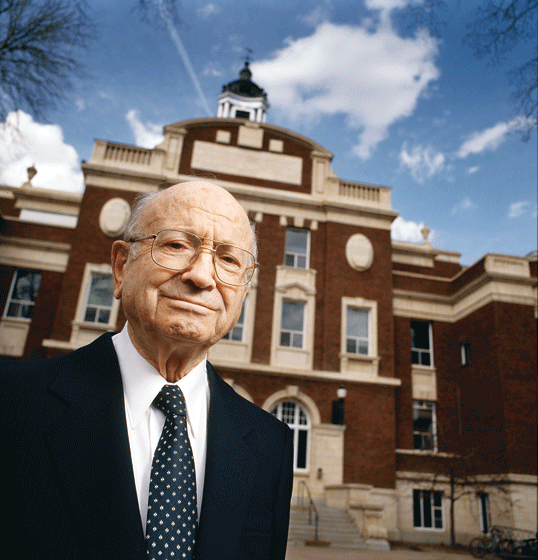
In almost seven decades of practising medicine, Theodore (Teddy) Aaron, '39 BSc, '42 MD, not only witnessed major changes in the discipline, he was at the forefront of a number of them. He was the first person in Alberta to administer penicillin, and his research led to the use of antihistamines in cold medications.
The breadth of Ted's contributions to health care in Alberta is recognized in professional circles in his being named one of Alberta's Physicians of the Century and receiving the Pharmacy Centennial Award of Distinction-the only person to make both lists.While he was doing his internship at the Royal Alexandra Hospital, Ted obtained penicillin from Ottawa and administered it to a patient via an IV drip. In order to reuse it for other patients, and having training in chemistry, he extracted the antibiotic from the patient's urine to treat others, with excellent results.
Always alert to happenings on the forefront of medical research and practice, Ted was the first in Western Canada to do Rh blood typing to ensure compatibility for blood transfusions. He became interested in allergic rhinitis-the cluster of symptoms triggered by breathing allergens-and decided to pursue graduate studies in New York, where he worked alongside Robert Cooke, the founder of the American Academy of Allergy and Clinical Immunology.
At the University of Pittsburgh, Ted conducted major pharmacological and clinical studies on new antihistamines and identified two-neohetramine and thephorin-as having very low side effects, making them suitable for over-the-counter sales. Neohetramine, in particular, he found to decrease cold symptoms and, as a result of his clinical studies, the use of antihistamines in cold remedies has become universal.
During four years of intense study in the U.S., Ted also spent time as a teaching and research fellow at the University of Pittsburgh, served as a resident physician in pulmonary medicine at the Albert Einstein Hospital in New York, and was a fellow in medicine at the Lahey Clinic in Boston. Despite many offers of attractive positions in the U.S., he chose to return to Edmonton, arriving back in 1950 as one of the first trained allergists in Western Canada.
Ted had just nicely settled into his allergy practice when the polio epidemic of 1953 redirected his attention. Having trained in pulmonary medicine, he volunteered to work with polio patients and, in 1955, founded a pulmonary laboratory to study their respiratory disabilities. He directed the lab, located at the U of A, until he returned his focus solely to his allergy practice in 1957.
In the ensuing years, his reputation as an allergist continued to grow. In addition to treating patients, he taught at the University, lectured around the world, and initiated the first course for the American College of Physicians at the Banff Centre. And his innovations continued. In collaboration with the pharmaceutical company Merck, he designed the first nasal steroid aerosol spray for use on seasonal and perennial rhinitis and the control of nasal polyps. To treat a patient with severe allergic swelling in the eyes, he worked with a pharmacist to design eye drops incorporating a drug normally inhaled. That preparation was later marketed under the name Opticrom.
At 94, Ted still has an extraordinary passion for education and medical discovery. But his contributions to the community go beyond the medical. He has provided leadership to many community organizations, including Scouts Canada, the Edmonton Symphony Orchestra, and the Phoenix Theatre. He was also the president of the Alberta Ballet and the Council of Christians and Jews and is a generous supporter of the U of A, having established four endowments for student education.
Looking back at an extraordinary career, Ted says simply, "I enjoyed the practice of medicine, and I enjoyed the people."
We at New Trail welcome your comments. Robust debate and criticism are encouraged, provided it is respectful. We reserve the right to reject comments, images or links that attack ethnicity, nationality, religion, gender or sexual orientation; that include offensive language, threats, spam; are fraudulent or defamatory; infringe on copyright or trademarks; and that just generally aren’t very nice. Discussion is monitored and violation of these guidelines will result in comments being disabled.